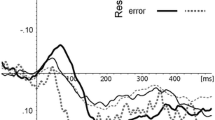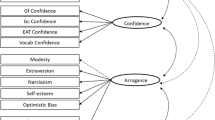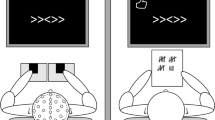Abstract
Perfectionistic concern over mistakes refers to the tendency to react negatively to mistakes, to interpret mistakes as equivalent to failure, and to believe that one will lose the respect of others following failure (Frost, Marten, Lahart, & Rosenblate, 1990). In this experiment, the reactions of subjects high and low in perfectionistic concern over mistakes to a task with a high frequency of mistakes and a task with a low frequency of mistakes were examined. People high in perfectionistic concern over mistakes reacted with more negative mood, lowered confidence, and a greater sense that they “should have done better” compared to subjects low in perfectionistic concern over mistakes. Furthermore, high-perfectionistic-concern-over-mistake subjects believed others seeing their performance would perceive them as less intelligent, and they were also less willing to share their performance results. These differences between subjects high and low in perfectionistic concern over mistakes were almost exclusive to the high-mistake-frequency condition. There were few differences in the low-mistake-frequency task.
Similar content being viewed by others
References
Beck, A. T. (1976).Cognitive therapy and the emotional disorders. New York: International Universities Press.
Burns, D. (1980, November). The perfectionist's script for self-defeat.Psychology Today, pp. 34–51.
Ellis, A. (1962).Reason and emotion in psychotherapy. New York: Lyle Stuart.
Frost, R. O., Heimberg, R. G., Holt, C., Mattia, J., & Neubauer, A. (1993). A comparison of two measures of perfectionism.Personality and Individual Differences, 14, 119–126.
Frost, R. O., & Henderson, K. J. (1991). Perfectionism and reactions to athletic competition.Journal of Sport & Exercise Psychology, 13, 323–335.
Frost, R. O., Lahart, C. M., & Rosenblate, R. (1991). The development of perfectionism.Cognitive Therapy and Research, 15, 469–489.
Frost, R. O., & Marten, P. A. (1990). Perfectionism and evaluative threat.Cognitive Therapy and Research, 14, 559–572.
Frost, R. O., Marten, P., Lahart, C., & Rosenblate, R. (1990). The dimensions of perfectionism.Cognitive Therapy and Research, 14, 449–468.
Hamachek, D. E. (1978). Psychodynamics of normal and neurotic perfectionism.Psychology, 15, 27–33.
Heimberg, R. G. (1991).Cognitive behavioral treatment of social phobia in a group setting: A treatment manual (2nd ed.). Unpublished manuscript available from the author, Center for Stress and Anxiety Disorders, Pine West Plaza, Building 4, Washington Avenue Extension, Albany, NY 12205.
Hewitt, P. L., & Flett, G. L. (1991). Perfectionism in the self and social contexts: Conceptualization, assessment, and association with psychopathology.Journal of Personality and Social Psychology, 60, 456–470.
Hewitt, P. L., Flett, G. L., Turnbull-Donovan, W., & Mikail, S. F. (1991). The multi-dimensional perfectionism scale: Reliability, validity, and psychometric properties in psychiatric samples.Psychological Assessment, 3, 464–468.
Hope, D. A. (1991).The revised Stroop color-naming task for social phobics. Lincoln: University of Nebraska — Lincoln.
Hope, D. A., Rapee, R. M., Heimberg, R. G., & Dombeck, M. J. (1990). Representations of the self in social phobia: Vulnerability to social threat.Cognitive Therapy and Research, 14, 177–189.
Klein, G. S. (1964). Semantic power measured through the interference of words with color-naming.American Journal of Psychology, 77, 576–589.
Mattia, J. I., Heimberg, R. G., Faccenda, K., Holt, C., & Frost, R. O. (1992).Perfectionism and social phobia. Paper presented at the annual meeting of the Association for the Advancement of Behavior Therapy, Boston.
Mattia, J. I., Heimberg, R. G., & Hope, D. A. (1993). The revised Stroop color-naming task in social phobics.Behaviour Research and Therapy, 31, 305–313.
Pacht, A. R. (1984). Reflections on perfection.American Psychologist, 39, 386–390.
Stroop, J. R. (1938). Factors affecting speed in serial verbal reactions.Psychological Monographs, 50, 38–48.
Author information
Authors and Affiliations
Rights and permissions
About this article
Cite this article
Frost, R.O., Turcotte, T.A., Heimberg, R.G. et al. Reactions to mistakes among subjects high and low in perfectionistic concern over mistakes. Cogn Ther Res 19, 195–205 (1995). https://doi.org/10.1007/BF02229694
Issue Date:
DOI: https://doi.org/10.1007/BF02229694




